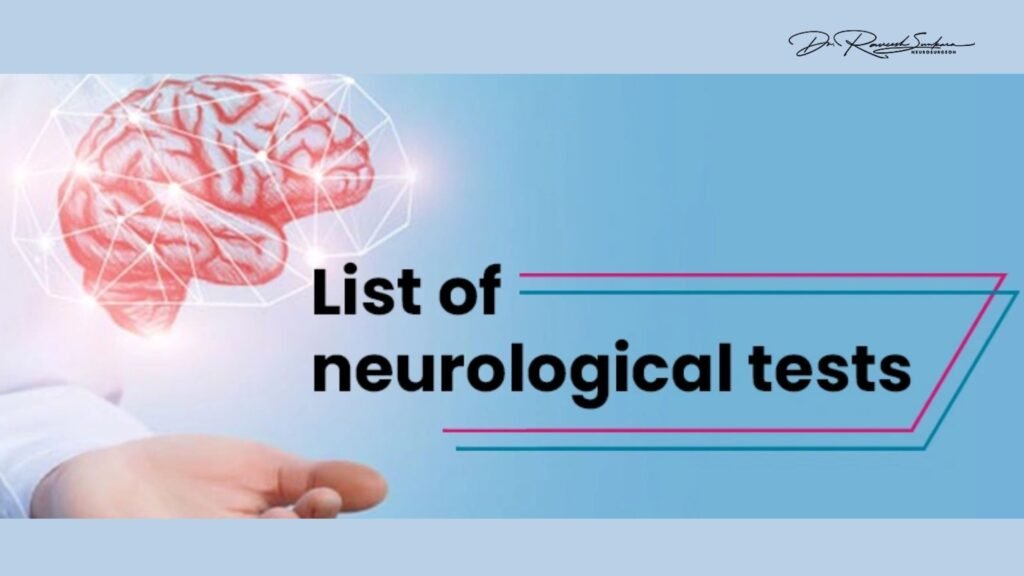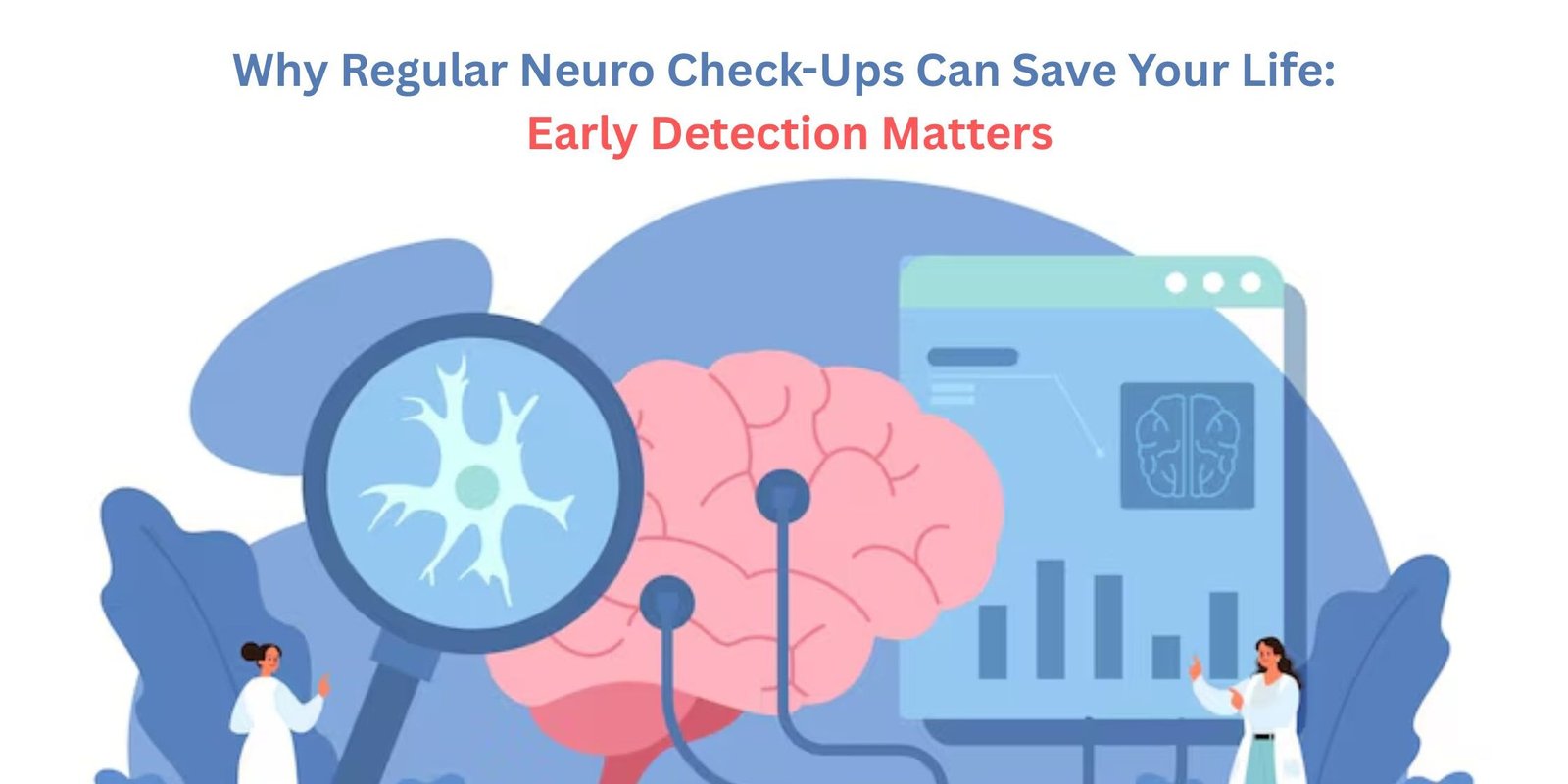A regular neuro check-up can save your life by finding brain or nerve problems early on, before they get worse.
According to the WHO, more than 11 million people around the world die from neurological disorders every year. When checked by the best neurologist in Hyderabad, early detection can help save many lives.
A lot of people visit a neurologist only when their symptoms get worse. But your brain and nerves control your entire body. If you don’t deal with minor problems, they can grow into big problems. That is why regular neuro visits matter.
Key Takeaways
- Early neuro check-ups can identify that silent issue before it gets dangerous.
- Neurological examinations are painless and simple, but highly efficient.
- Turning to the right specialist means getting the right diagnosis and safe treatment.
- Brain and nerve symptoms shouldn’t be ignored, especially the early ones.
- Regular check-ups are a great way to keep nerves healthy in the long run and to be safe from major disorders.
Why You Must Prioritise Routine Visits to the Best Neurologist in Hyderabad
Nerve diseases can be avoided by seeing a neurologist regularly. They can spot minor changes that you might overlook at first. There are many issues with the nervous system that start slowly and silently. The best neurologist in Hyderabad can find these hidden issues before they get worse by going on regular trips. They also cover areas that normal health checks don’t always inspect your nerve strength, reactions, coordination, memory, balance, and other things. This protects the brain and nerves completely.
How Regular Health Checks Help You Understand Your Nerve Health

Routine regular health checks are not only for your heart or blood sugar. You need to take care of both your brain and nerves. These checks help find small changes quickly.
What a regular health check-up includes to protect your brain and nerves
- Reflex tests check how quickly your body reacts and detect nerve delays.
- Tests of your balance can reveal secret problems and show how strong your mind and body are.
- Coordination tests help find nerve or brain stress early on and help plan more tests.
- Checks for numbness or tingling can show signs of nerve damage and let you know about it.
- Memory and speech tests catch cognitive changes and show signs of brain loss early on.
Each point is a simple and safe way for your doctor to get a better idea of your overall brain health.
Why a Neurological Examination Matters for Early Detection
A neurological examination is a series of simple tests done by a nerve specialist. These tests look at how you think, move, and coordinate your senses, and think.
Purpose of Neurological Assessment
- A neurological assessment checks how well your nerves respond and how well your brain sends messages.
- It finds early signs of problems and stops them from getting worse.
- It keeps an eye on nerve health over time and makes sure the brain works properly.
- It identifies hidden brain injuries or clots that are hidden and helps with early care.
- It helps decide the best way to treat you and avoids unnecessary risks.
Regular evaluations are easy, painless, and highly effective.
Neurologist Tests You Should Never Ignore
Neurologists use tests to learn more about the health of your nerves. These help detect health problems like headaches, strokes, epilepsy, neuropathy, or problems with the spine.

Common neurologist tests for better brain and nerves
- MRI tests show the structure of the brain and spine and detect problems early on.
- Nerve Conduction Studies test the speed of nerves and show where damage is happening.
- EEG checks the brain’s electrical activity and can find seizures.
- Nerve-infecting illnesses can be found and treated safely with blood tests.
- Cognitive tests measure memory and mental sharpness and can spot early signs of dementia.
A doctor for nerves and muscles uses these results to guide your recovery.
When to See a Neurologist: Signs You Should Never Ignore
A lot of people wait too long. But your body lets you know early on.
Signs that you must visit a nearby neurologist
- Headaches that happen often and disrupt routine need more investigation.
- Feeling dizzy for a long time is a sign of a nerve disorder.
- Arms or legs feeling weak or numb all of a sudden are signs of nerve compression.
- When memory loss happens too often, it gets in the way of daily life.
- Loss of balance or falling down a lot can be a sign of problems with the brain or nerves.
- Tingling and sharp pain in the back or neck may be a sign of damage to the spine.
- Vision changes, such as hazy or double vision, can be a sign of harm in the brain.
If you experience even one, meet a nearby neurologist doctor soon.
Why You Must Not Delay Seeing a Head Specialist Doctor
A head specialist doctor checks the brain, skull, nerves, blood flow, and other parts of the body. If you get care right away, you can stop strokes, seizures, and illnesses that get worse over time.
Delaying can affect your long-term brain health
- If you don’t treat the signs, they might get worse and be harder to treat.
- It’s more likely that you will have a stroke if you don’t treat headaches.
- Skipping checks may delay Life-saving treatment and affect recovery.
- It’s more likely that treatment will work and heal more quickly when it’s diagnosed early on.
- To keep your nerve health stable and protect normal function, you should get regular check-ups.
That’s why it’s essential to choose the right expert.
Why a Nerve-Related Doctor Plays a Life-Saving Role
A nerve-related doctor is a specialist who is involved with the care of the nervous system, muscles, spine, and brain. They are the ones who, through their knowledge and experience, are able to detect diseases even before the patient shows obvious symptoms.
How a nerve specialist keeps you safe
- First of all, they are very vigilant with the most minor changes of nerves, and deliver the closest attention and care that is most suitable for the patient.
- They not only watch the evolution of a disease, but they also have the liberty to adjust the treatment.
- They prevent long-term complications and improve our health span.
- They ensure personalized treatment and avoid guesswork.
What You Can Expect in a Standard Neurological Assessment
Below is a simple table that explains what happens during a routine neuro check-up.
| Part of Check-Up | What It Includes | Why It Matters |
| Reflex Testing | Knee, elbow, and ankle reflex checks | Shows nerve speed and function |
| Cognitive Check | Memory, speech, and clarity tests | Detects early cognitive issues |
| Movement Check | Muscle strength and walking test | Spots motor weakness |
| Sensory Check | Touch, pain, and temperature response | Finds nerve damage |
| Coordination Check | Finger-to-nose or balance test | Reveals cerebellum issues |
These steps help your neurologist understand your full nervous system behaviour.
Why Choosing the Right Specialist Matters
You must choose a neurologist who not only understands simple cases but also complex ones. The best neurosurgeon in Hyderabad, such as Dr Raveesh Sunkara, is the one who ensures the proper treatment for any kind of neurological issues.
Why do you need the best specialist?
- They can quickly detect the most subtle signs and thus prevent the condition from getting worse.
- Moreover, they rely on state-of-the-art tests and instruments, thereby achieving high precision.
- They efficiently manage emergency symptoms and, thus, provide the right guidance.
- In addition, they formulate personalised treatment plans and, hence, recovery becomes easier.
- Also, they are always there for long-term wellness and therefore, future risks are avoided.
Your Brain Needs Care, Take Action Today!
Regular neuro check-ups can save your life as they detect diseases at an early stage. Such checks enable you to avoid dangerous situations, speed up your healing process, and keep yourself mentally fit. In case you are looking for a safe and precise treatment, definitely, the best neurologist in Hyderabad who values early detection should be your choice. To know more or schedule your appointment, consult Dr. Raveesh Shunkara by visiting our website or by contacting us..
FAQs
When is it necessary for me to consult a neurologist?
If you experience a headache, numbness, dizziness, or memory impairment, you should see a neurologist.
Is a neurological examination painful?
Not at all. It is very easy, non-invasive, and consists of simple tests of the body and nerves.
What does a neurological assessment consist of?
It consists of tests for reflexes, movement, sensation, memory, and coordination.
Can regular health check-ups reveal neurological disorders at an early stage?
Definitely, they are instrumental in detecting very early nerve changes before the appearance of symptoms.
Which doctor is the most suitable for nerves and muscles?
A neurologist is the expert who deals with the problems of nerves, muscles, and brain.







